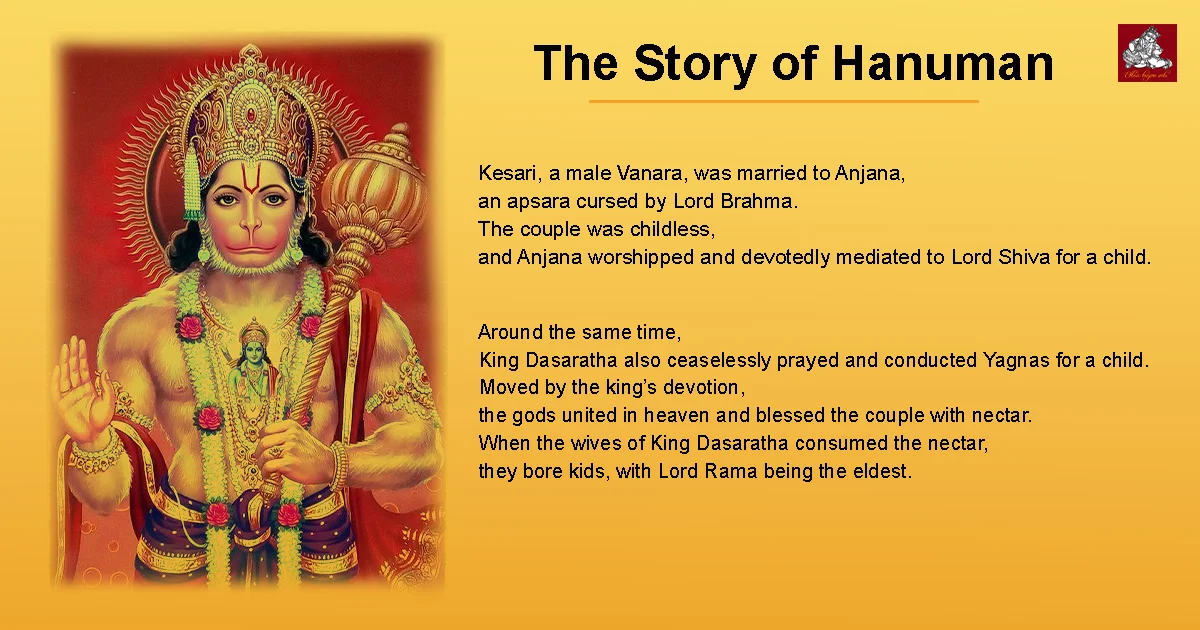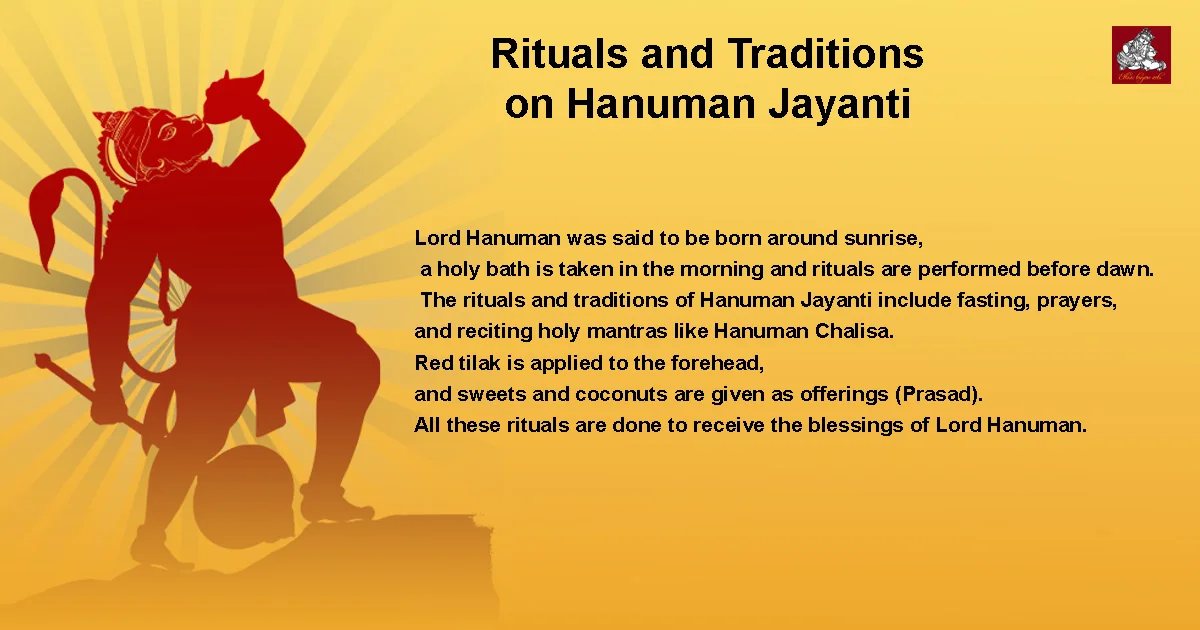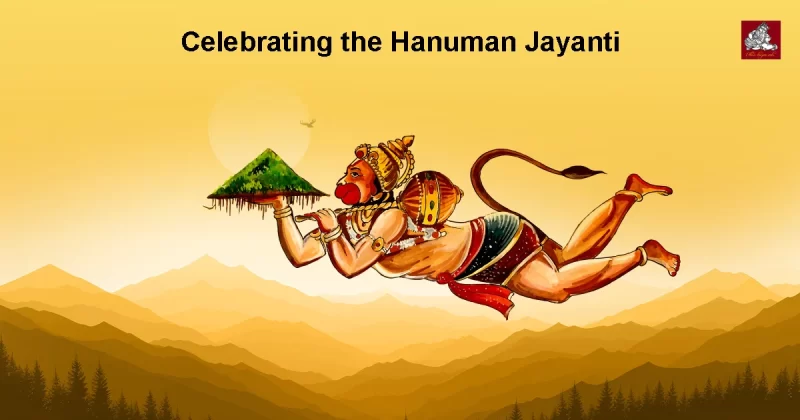Exploring the Spiritual Significance of Hanuman Jayanti
May 14, 2024
Known for his eternal love for Lord Rama, Lord Hanuman is the symbol of indestructible strength and selflessness. On the auspicious day of Hanuman Jayanti, devotees recite prayers, fast, seek blessings, and embody the virtues of Lord Hanuman.
In this Kali Yuga, where the dark times make us forget our roots, values, and truth, Hanuman Jayanti acts as a day of reflection and remembrance.
In this blog, let’s cover the holy story, belief, and significance of Hanuman Jayanti.
The birth story of Hanuman
Son of Anjana Devi, Lord Hanuman is said to have been born around the same time as Lord Rama and battled alongside him in the battle of Lanka.
Kesari, a male Vanara, was married to Anjana, an apsara cursed by Lord Brahma. The couple was childless, and Anjana worshipped and devotedly mediated to Lord Shiva for a child.
Around the same time, King Dasaratha also ceaselessly prayed and conducted Yagnas for a child. Moved by the king’s devotion, the gods united in heaven and blessed the couple with nectar. When the wives of King Dasaratha consumed the nectar, they bore kids, with Lord Rama being the eldest.

It is also believed that while the nectar was being passed from heaven to earth, Lord Shiva wanted Lord Vayu to bid his blessing to Anjana. Lord Vayu took some of the nectar and asked Anajan to consume it; hence, Lord Hanuman was born.
It is also said that Lord Hanuman is blessed with the power of Lord Shiva and Lord Vayu. In different versions, Lord Hanuman is said to be the reincarnation of Lord Shiva. This is due to the promise that Lord Shiva made. He will reincarnate in the human world and help Lord Vishnu’s avatar, Rama, in his battle against Ravana.
Lord Hanuman’s Youth and the Holy Battle
As the famous legend goes, when Lord Hanuman was a child, he got severely hungry. In the fit of youth and fathomless hunger, he mistook the yellow and blazing sun to be a ripe mango. He flew ceaselessly towards the mango, ignoring the distance and the warnings from the gods.
Angered by Baby Hanuman’s actions, Lord Indra struck him with a thunderbolt and rendered Lord Hanuman unconscious with a broken jaw. Angered by Lord Indra’s action and upset by the loss of his son, Lord Vayu left Earth, which affected the quality of life of every living being on Earth.
In an attempt to soothe Lord Vayu, Lord Shiva brought baby Hanuman back to life.
Lord Hanuman was blessed with invincible powers. Brahma blessed him with the power to shrink and expand his size at will. Agni granted a boon that fire would never hurt Lord Hanuman. Varuna Bhagavan blessed him that water would not harm him, and Lord Vayu himself presented Lord Hanuman with the boon that he would be able to fly at the speed of wind.
Later, Lord Hanuman served Lord Rama as his most pious devotee and fought beside him in the battle of Lanka.
The famous story of Lord Hanuman during the battle is when he saved Lakshmana from near death.
During the long and hard-fought battle to save Maa Sita, Lakshama fell ill and faced death. The only medicine that could heal him was Sanjeevini, found in the Himalayas. From the battleground situated in the Southern Tip, Hanuman flew with the speed of the wind to find the herb.
Upon reaching him, he was confused about the amount of herb required. Instead of taking chances, he grew in size and lifted the mountain itself, which shook the whole world for a second, and even the gods were surprised by this act. He flew back with the whole mountain, and Lakshmana was saved.
The spiritual significance of Hanuman Jayanti for devotees
From the holy stories written in the scriptures, it is apparent that Lord Hanuman was a God of eminent virtues. He is the epitome of selflessness, devotion, and courage.
Commemorating the birthday of Lord Hanuman, Hanuman Jayanti is the day to look back on the holy story and virtues of the Brahmachari.
It is also the day of spiritual reflection and introspection, and the time to uphold and live by the virtues of Lord Hanuman. He devoted his whole life to Lord Rama and overcame challenges with steadfast commitment.
Rituals and Traditions on Hanuman Jayanti
Lord Hanuman was said to be born around sunrise, so a holy bath is taken in the morning and rituals are performed before dawn. The rituals and traditions of Hanuman Jayanti include fasting, prayers, and reciting holy mantras like Hanuman Chalisa. Red tilak is applied to the forehead, and sweets and coconuts are given as offerings (Prasad). All these rituals are done to receive the blessings of Lord Hanuman.

A special procession dedicated to Lord Hanuman also takes place in several parts of India. In the North, Hanuman Jayanthi is celebrated on Purnima Thithi. However, in the South, it is celebrated on Margashirsha Amavasya.
Conclusion
Lord Hanuman is considered to be the 11th Rudra avatar of Lord Shiva, and he is the symbol of courage, knowledge, and utmost devotion. Hanuman Jayanti is one of the most important festivals in the Hindu religion and is worshipped with great reverence.
Lord Hanuman is believed to bless his devotees with the power to face any challenge that comes their way and bring happiness.
As the festivities draw to a close, may the blessings of Lord Hanuman fill our hearts with strength, wisdom, and inner peace, guiding us on the path of righteousness and devotion.
Also, bring Lord Hanuman home, with an exquisitely painted Hanuman Tanjore painting, and receive his blessings.
Jai Hanuman!

